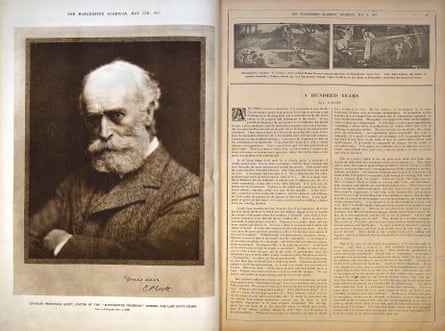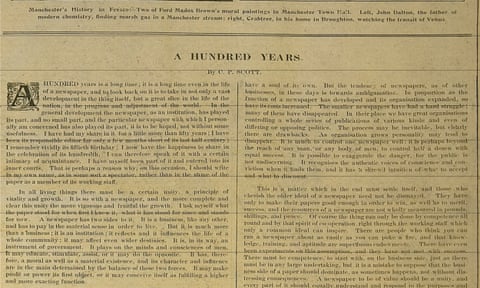A Hundred Years
A hundred years is a long time; it is a long time even in the life of a newspaper, and to look back on it is to take in not only a vast development in the thing itself, but a great slice in the life of the nation, in the progress and adjustment of the world. In the general development the newspaper, as an institution, has played its part, and no small part, and the particular newspaper with which I personally am concerned has also played its part, it is to be hoped, not without some usefulness. I have had my share in it for a little more than fifty years; I have been its responsible editor for only a few months short of its last half-century; I remember vividly its fiftieth birthday; I now have the happiness to share in the celebration of its hundredth. I can therefore speak of it with a certain intimacy of acquaintance. I have myself been part of it and entered into its inner courts. That is perhaps a reason why, on this occasion, I should write in my own name, as in some sort a spectator, rather than in the name of the paper as a member of its working staff.
In all living things there must be a certain unity, a principle of vitality and growth. It is so with a newspaper, and the more complete and clear this unity the more vigorous and fruitful the growth. I ask myself what the paper stood for when first I knew it, what it has stood for since and stands for now. A newspaper has two sides to it. It is a business, like any other, and has to pay in the material sense in order to live. But it is much more than a business; it is an institution; it reflects and it influences the life of a whole community; it may affect even wider destinies. It is, in its way, an instrument of government. It plays on the minds and consciences of men. It may educate, stimulate, assist, or it may do the opposite. It has, therefore, a moral as well as a material existence, and its character and influence are in the main determined by the balance of these two forces. It may make profit or power its first object, or it may conceive itself as fulfilling a higher and more exacting function.
I think I may honestly say that, from the day of its foundation, there has not been much doubt as to which way the balance tipped so far as regards the conduct of the paper whose fine tradition I inherited and which I have had the honour to serve through all my working life. Had it not been so, personally I could not have served it. Character is a subtle affair, and has many shades and sides to it. It is not a thing to be much talked about, but rather to be felt. It is the slow deposit of past actions and ideals. It is for each man his most precious possession, and so it is for that latest growth of time the newspaper. Fundamentally it implies honesty, cleanness, courage, fairness, a sense of duty to the reader and the community. A newspaper is of necessity something of a monopoly, and its first duty is to shun the temptations of monopoly. Its primary office is the gathering of news. At the peril of its soul it must see that the supply is not tainted. Neither in what it gives, nor in what it does not give, nor in the mode of presentation must the unclouded face of truth suffer wrong. Comment is free, but facts are sacred. “Propaganda”, so called, by this means is hateful. The voice of opponents no less than that of friends has a right to be heard. Comment also is justly subject to a self-imposed restraint. It is well to be frank; it is even better to be fair. This is an ideal. Achievement in such matters is hardly given to man. Perhaps none of us can attain to it in the desirable measure. We can but try, ask pardon for shortcomings, and there leave the matter.
But, granted a sufficiency of grace, to what further conquests may we look, what purpose serve, what tasks envisage? It is a large question, and cannot be fully answered. We are faced with a new and enormous power and a growing one. Whither is the young giant tending? What gifts does he bring? How will he exercise his privilege and powers? What influence will he exercise on the minds of men and on our public life? It cannot be pretended that an assured and entirely satisfactory answer can be given to such questions. Experience is in some respects disquieting. The development has not been all in the direction which we should most desire.
One of the virtues, perhaps almost the chief virtue, of a newspaper is its independence. Whatever its position or character, at least it should have a soul of its own. But the tendency of newspapers, as of other businesses, in these days is towards amalgamation. In proportion as the function of a newspaper has developed and its organisation expanded, so have its costs increased. The smaller newspapers have had a hard struggle; many of them have disappeared. In their place we have great organisations controlling a whole series of publications of various kinds and even of differing or opposing politics. The process may be inevitable, but clearly there are drawbacks. As organisation grows personality may tend to disappear. It is much to control one newspaper well; it is perhaps beyond the reach of any man, or any body of men, to control half a dozen with equal success. It is possible to exaggerate the danger, for the public is not undiscerning. It recognises the authentic voices of conscience and conviction when it finds them, and it has a shrewd intuition of what to accept and what to discount. This is a matter which in the end must settle itself, and those who cherish the older ideal of a newspaper need not be dismayed. They have only to make their papers good enough in order to win, as well as to merit, success, and the resources of a newspaper are not wholly measured in pounds, shillings, and pence. Of course the thing can only be done by competence all round and by that spirit of cooperation right through the working staff which only a common ideal can inspire.

There are people who think you can run a newspaper about as easily as you can poke a fire, and that knowledge, training, and aptitude are superfluous endowments. There have even been experiments on this assumption, and they have not met with success. There must be competence, to start with, on the business side, just as there must be in any large undertaking, but it is a mistake to suppose that the business side of a paper should dominate, as sometimes happens, not without distressing consequences. A newspaper to be of value should be a unity, and every part of it should equally understand and respond to the purposes and ideals which animate it. Between its two sides there should be a happy marriage, and editor and business manager should march hand in hand, the first, be it well understood, just an inch or two in advance. Of the staff much the same thing may be said. They should be a friendly company. They need not, of course, agree on every point, but they should share in the general purpose and inheritance. A paper is built up upon their common and successive labours, and their work should never be task work, never merely dictated. They should be like a racing boat’s crew, pulling well together, each man doing his best because he likes it, and with a common and glorious goal.
That is the path of self-respect and pleasure; it is also the path of success. And what a work it is how multiform, how responsive to every need and every incident of life! What illimitable possibilities of achievement and of excellence! People talk of “journalese” as though a journalist were of necessity a pretentious and sloppy writer; he may be, on the contrary, and very often is, one of the best in the world. At least he should not be content to be much less. And then the developments. Every year, almost every day, may see growth and fresh accomplishment, and with a paper that is really alive, it not only may, but does. Let anyone take a file of this paper, or for that matter any one of half a dozen other papers, and compare its whole make-up and leading features today with what they were five years ago, ten years ago, twenty years ago, and he will realise how large has been the growth, how considerable the achievement. And this is what makes the work of a newspaper worthy and interesting. It has so many sides, it touches life at so many points, at every one there is such possibility of improvement and excellence. To the man, whatever his place on the paper, whether on the editorial, or business, or even what may be regarded as the mechanical side – this also vitally important in its place – nothing should satisfy short of the best, and the best must always seem a little ahead of the actual. It is here that ability counts and that character counts, and it is on these that a newspaper, like every great undertaking, if it is to be worthy of its power and duty, must rely.
CP Scott, 5 May 1921
